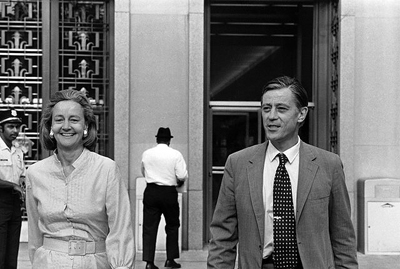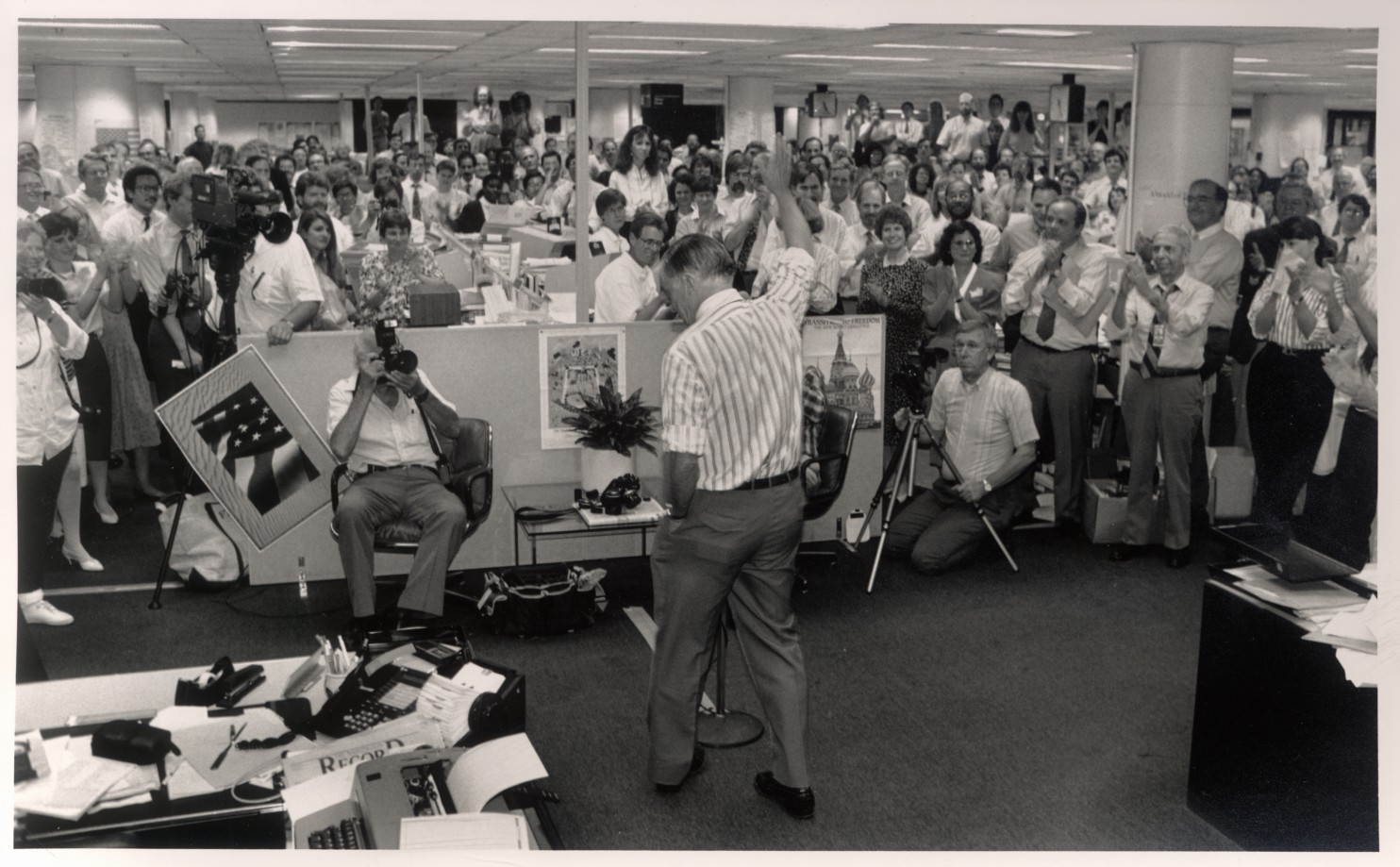
Bradlee with Washington Post owner Katherine Graham in 1971.
Ben Bradlee’s death saddens me and many, many other people. In the 1970s and 1980s, Washington Post managing editor Bradlee was an idol to me and most of my friends in college, in Washington, D.C. or in New York when we were writing or editing student dailies, selling our first freelance piece, doing our first jobs with a newspaper or wire service or writing a first book. Bradlee set the standard; he was the standard. He was brave, smart, patrician, demanding, salty, funny and fun.
No one was more dedicated to journalism done right, done under pressure and done both for its art and for the public good. No one was cooler. We felt like we knew him. We wanted to be him.
Last night around midnight, the Washington Post published this comprehensive biography and obituary, written by another Post former managing editor:
Ben Bradlee Dies at 93
By Robert G. Kaiser
Benjamin C. Bradlee, who presided over The Washington Post newsroom for 26 years and guided The Post’s transformation into one of the world’s leading newspapers, died Oct. 21 at his home in Washington of natural causes. He was 93.
From the moment he took over The Post newsroom in 1965, Mr. Bradlee sought to create an important newspaper that would go far beyond the traditional model of a metropolitan daily. He achieved that goal by combining compelling news stories based on aggressive reporting with engaging feature pieces of a kind previously associated with the best magazines. His charm and gift for leadership helped him hire and inspire a talented staff and eventually made him the most celebrated newspaper editor of his era.
The most compelling story of Mr. Bradlee’s tenure, almost certainly the one of greatest consequence, was Watergate, a political scandal touched off by The Post’s reporting that ended in the only resignation of a president in U.S. history.
But Mr. Bradlee’s most important decision, made with Katharine Graham, The Post’s publisher, may have been to print stories based on the Pentagon Papers, a secret Pentagon history of the Vietnam War. The Nixon administration went to court to try to quash those stories, but the U.S. Supreme Court upheld the decision of the New York Times and The Post to publish them.
President Obama recalled Mr. Bradlee’s legacy on Tuesday night in a statement that said: “For Benjamin Bradlee, journalism was more than a profession “” it was a public good vital to our democracy. A true newspaperman, he transformed the Washington Post into one of the country’s finest newspapers, and with him at the helm, a growing army of reporters published the Pentagon Papers, exposed Watergate, and told stories that needed to be told “” stories that helped us understand our world and one another a little bit better. The standard he set “” a standard for honest, objective, meticulous reporting “” encouraged so many others to enter the profession. And that standard is why, last year, I was proud to honor Ben with the Presidential Medal of Freedom. Today, we offer our thoughts and prayers to Ben’s family, and all who were fortunate to share in what truly was a good life.”
The Post’s circulation nearly doubled while Mr. Bradlee was in charge of the newsroom “” first as managing editor and then as executive editor “” as did the size of its newsroom staff. And he gave the paper ambition.
Mr. Bradlee stationed correspondents around the globe, opened bureaus across the Washington region and from coast to coast in the United States, and he created features and sections “” most notably Style, one of his proudest inventions “” that were widely copied by others.
During his tenure, a paper that had previously won just four Pulitzer Prizes, only one of which was for reporting, won 17 more, including the Public Service award for the Watergate coverage.
“Ben Bradlee was the best American newspaper editor of his time and had the greatest impact on his newspaper of any modern editor,” said Donald E. Graham, who succeeded his mother as publisher of The Post and Mr. BradÂlee’s boss.
“So much of The Post is Ben,” Mrs. Graham said in 1994, three years after Mr. Bradlee retired as editor. “He created it as we know it today.”
Leonard Downie Jr., who succeeded Mr. BradÂlee as The Post’s executive editor in 1991, said, “Ben’s influence remained very much alive at The Washington Post long after he retired, distinguishing the newspaper and our newsroom as unique in journalism.” President Obama saluted Mr. Bradlee’s role at The Post when giving him the country’s highest civilian honor, the Presidential Medal of Freedom, in 2013: “He transformed that newspaper into one of the finest in the world.”
Mr. Bradlee’s patrician good looks, gravelly voice, profane vocabulary and zest for journalism and for life all contributed to the charismatic personality that dominated and shaped The Post. Modern American newspaper editors rarely achieve much fame, but Mr. Bradlee became a celebrity and loved the status.

